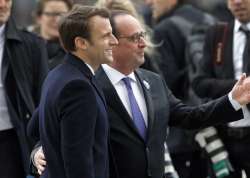Newly elected-French President Macron prepares for the Challenges ahead
Latest shift to Power, newly elected French President Emmanuel Macron laid the ground work for Monday, announcing a visit to Germany, a namechange for his political movement and appearing with his predecessor at a solemn World War II commemoration.

Latest shift to Power, newly elected French President Emmanuel Macron laid the ground work for Monday, announcing a visit to Germany, a namechange for his political movement and appearing with his predecessor at a solemn World War II commemoration.
Macron handily defeated far-right National Front leader Marine Le Pen in Sunday’s presidential runoff, and now must pull together a majority of lawmakers for his year-old political movement to run in the mid-June legislative election.
His party is changing its name to La Republique En Marche (Republic on the Move) as it prepares a list of candidates. Macron has promised that half of those candidates will be new to elected politics, as he was before his victory Sunday.
Macron won the presidency with 66 percent of votes cast for a candidate. But a high number of blank or spoiled votes and unusually low turnout are signs of an electorate dissatisfied with its choices.
Le Pen says she will lead the opposition to Macron.
On Monday, a French national holiday, the president-elect joined President Francois Hollande in commemoration of the end of World War II. The holiday marks the day of the formal German defeat in World War II.
It was the first time the men had appeared in public together since Macron resigned in August 2016 as Hollande’s economy minister to run for president — a decision that was received coldly by the French leader at the time, according to French media.
On Monday, though, Hollande gripped Macron’s arm before the two men walked side by side and then announced the transfer of power would take place on Sunday, a week after the election.
Monday also marked decades of peace in Western Europe, something Macron made a cornerstone of his campaign against Le Pen’s brand of populism. Le Pen called for France to leave the European Union and drop the euro currency in favor of the franc.
Sylvie Goulard, a French deputy to the European Parliament, said Macron would make Berlin his first official visit, with perhaps a stop to see French troops stationed abroad as well.
The National Front, meanwhile, is also gearing up for a name change — if not a makeover of its ideas — after Le Pen’s decisive loss. In interviews Monday, National Front officials said the party founded by her father would get a new name to try and draw in a broader spectrum of supporters.
“The National Front is a tool that will evolve to be more efficient, bring even more people together after the number of voters we reached last night. And so we have an immense responsibility vis-a-vis the French people, who trust us,” said Nicolas Bay, the party’s secretary-general.
Michael Roth, Germany’s deputy foreign minister, applauded Macron’s win but said the result was marred by the fact that 11 million people in France voted for Le Pen.
“It mustn’t become normal that right-wing extremists and populists achieve such strong results,” said Roth, whose portfolio includes relations with France. He suggested relaxing European Union rules on state spending to allow France to boost its economic growth.
“If Macron fails, then the next president will be Marine Le Pen and we need to prevent this at all costs,” he added.
On the financial front, European stock markets edged down in early trading as investors had been widely expecting Macron’s victory.
Though Macron’s victory is considered positive for the region’s economy and the euro currency, stocks had risen strongly in the previous two weeks on expectations of his win. France’s CAC 40 index, which last week touched the highest level since early 2008, slipped 0.8 percent to 5,391 on Monday.
Germany’s DAX was down 0.3 percent at 12,683 and Britain’s FTSE 100 was up 0.1 percent at 7,301.
The euro, which had risen Sunday night in the wake of the news of Macron’s victory, edged back down 0.5 percent to $1.0943